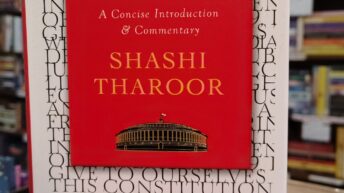
Reading this book felt less like reading a book and more like sitting across from a friend who narrates her story with unflinching honesty. Coming from a background in security studies, one of the things I have often observed about humanity is how people face difficulty, and when their family stands beside them, the human spirit can overcome any conflict or adversity. Aarti Pathak’s book is a testament to that very spirit—undaunted, fearless, and cinematic.
From the very beginning, when she draws us into her world at Moksha Dhaam, it stirred my own memories of my Nishu Maasi, whom we cremated just a few months ago. I can still picture the scene when Aarti Ji describes performing the last rites of her mother at the peak of the pandemic. Death teaches us many things, but most of all, it teaches us the permanence of the memory of our loved ones. Just as grief feels overwhelming, Aarti Ji shares the shocking discovery of her cancer. That timing, the collision of loss and diagnosis, sets the arduous task she undertakes in the chapters ahead. Yet, I felt throughout the book that her mother, from heaven, was guiding her every step of the way as she managed to beat cancer.
One of the most memorable aspects of the book is how Mrs. Pathak reframes pain. When her husband calls her chemotherapy sessions their “sixteen dates,” it feels as though she is adjusting her sails while her family stands firmly by her side. It reminded me of Nelda Blair’s words: “Cancer doesn’t have to define you.” Each session is painful, but with love and companionship, every storm can be weathered. I couldn’t help but smile when she described her “negative” as the infamous Red Devil drug, turning something terrifying into something almost humorous.
Another striking element is the way difficulties sometimes require surrender—to a higher self, to faith, to the divine. Her friends and family urging her to read the Hanuman Chalisa is a powerful reminder that faith often arrives as whispers from unexpected places. These moments became her refuge, not only for mourning her grief but also for spiritual learning. A recurring undercurrent in this memoir reminded me of Maa Durga, a Goddess we revere in Bengali culture, the embodiment of Shakti (Strength) who battles demons: – as Aarti Ji confronts her ‘demons’ – grief, cancer, and uncertainty.
The book also shines in its portrayal of family. Her children’s innocent yet piercing questions — “Mumma will be fine?” or “It won’t kill her?” — tug at the heart. Her husband’s steady presence, their fist-bumps after consultations, and his witty line after the radioactive PET scan (“You’re already radioactive!”) remind us that love can heal as deeply as medicine.
By the time the narrative moves to Mumbai, with its glittering high-rises and promise of fresh beginnings, the book evolves from a story of survival into a meditation on renewal. I was especially moved by her reflections on healing — not only through medicine, but also through rituals, prayers, and the quiet cultivation of gratitude.
What makes Triple Negative unforgettable is its balance. It neither glorifies suffering nor wallows in it. The author allows space for tears, anger, humour, and spirituality—sometimes all in the same breath. She shows us that survival is not just about fighting illness, but about transforming the way we live.
Aarti Ji has not only chronicled her journey with cancer and loss but has also gifted us a book that champions resilience, the human spirit, surrender, and—most importantly—a raw, unfiltered embrace of life itself. As a scholar of security studies, I see in this memoir a living case of resilience, but beyond the frameworks and theories, I envision her journey with the same fierce, protective, and nurturing spirit of womanhood whose resilience overwhelms all odds.






Add comment